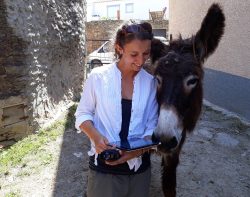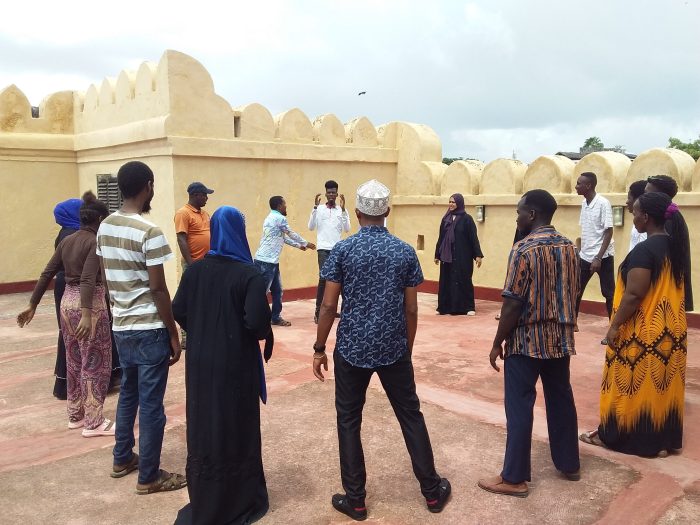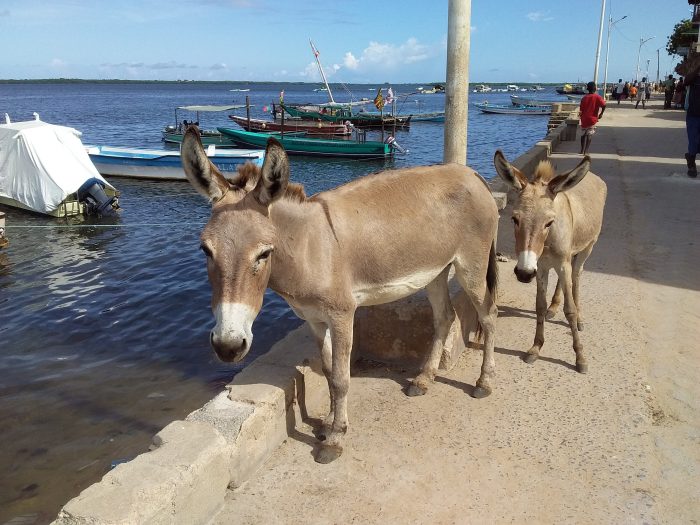Date: 23/01/2024
Author: Emily Haddy

Bio:
Dr Emily Haddy is a postdoctoral fellow with the SCDTP based at the University of Portsmouth. Her research focusses on increasing engagement and impact around her PhD which was on the factors affecting the welfare of working equids (donkeys, horses and mules). She hopes to use a variety of methods to engage with NGOs, academics of different disciplines and the communities who rely on working equids, with the goals of increasing information exchange between sectors, enhancing NGO programming and fostering positive behaviour change for animal welfare improvement.
Animal Welfare
Working equids (donkeys, horses and mules) support the livelihoods of some of the poorest people in the world and often provide a family’s sole source of income. However, despite their importance globally, levels of working equid welfare are poor and during my PhD research I witnessed this firsthand. Improving the welfare of these animals is crucial, not just to prevent their suffering but to safeguard the livelihoods of the communities that rely on them for work, transport and access to basic necessities – a healthy animal is a productive animal.
During my PhD I was lucky enough to work alongside NGOs within equid owning communities in Mexico, Portugal and Egypt. As the ultimate ‘end user’ (and those best placed to make positive day-to-day changes), I believe that equid owners should benefit from research designed to improve the welfare of the animals that they and their families rely on. However, this comes with inherent challenges: communities can be isolated, logistically difficult to reach, and low participant literacy levels can mean that more traditional methods of disseminating research results are inappropriate. Therefore, a new and creative approach is needed and that is exactly what I intend to do as part of my South Coast DTP fellowship!
Engaging with community
 I am writing this blog from Lamu Island, situated just off the coast of Kenya. There is no motorised transport on the island, so donkeys are heavily relied upon for transport, both of goods and people. My work here involves engaging with the community, both through focus groups and through the creative process of drama. Overall, the objectives of the project are, through dialogue with the community, to highlight some of the most common local risk factors for poor donkey welfare. By working with both donkey owners and an equid welfare NGO, The Donkey Sanctuary (who run a free clinic on the island offering veterinary services), we aim to identify some simple, context-specific solutions to these problems that can be realistically implemented.
I am writing this blog from Lamu Island, situated just off the coast of Kenya. There is no motorised transport on the island, so donkeys are heavily relied upon for transport, both of goods and people. My work here involves engaging with the community, both through focus groups and through the creative process of drama. Overall, the objectives of the project are, through dialogue with the community, to highlight some of the most common local risk factors for poor donkey welfare. By working with both donkey owners and an equid welfare NGO, The Donkey Sanctuary (who run a free clinic on the island offering veterinary services), we aim to identify some simple, context-specific solutions to these problems that can be realistically implemented.
Focus groups with donkey owners were the first stage of this process, participants were invited to discuss issues surrounding donkey welfare on Lamu. They shared their opinions on topics such as the importance of donkeys to livelihoods on the island, the most common welfare problems they see in their work, the struggle to get their voices heard in the policy arena where decisions are being made that affect their local environment and the everyday challenges they face in affording to feed their donkeys and protect them from the growing threat of plastic pollution (plastic ingestion kills a shocking number of donkeys and cattle on Lamu every year). They also discussed the changes they would like to see in order to provide solutions to some of the issues raised.
The dissemination of this information to others on Lamu is key in raising awareness of the challenges that donkey owners are facing and in encouraging others in the wider island community to engage in facilitating solutions. However, this information needs to be presented in a format that is suitable both culturally and across levels of understanding in the community in order to have impact. Arts-based initiatives, visual art, storytelling and performance in particular, are thought to have wide general appeal, breaking down barriers, and often reaching a large number of sometimes difficult to reach stakeholders (Bunn et al., 2020). Using a community-based arts approach (in this case theatre) will ensure that participants feel ownership over the art creation process, as well as the output. This will maximise the likelihood that the message within will change mindsets and behaviours.
 A selection of the issues raised in the focus groups were chosen for representation in a drama piece, acted by the talented local theatre group Lamu Arts and Theatre Alliance (LATA). Together we have spent a week creating and rehearsing the drama piece which is presented in the style of forum theatre. Forum theatre encourages audience participation by staging a narrative around characters who experience struggles within their community, ultimately leading to a ‘bad ending’ for the characters. Once acted, the play is then performed again but with audience members joining the cast to intervene at key points in the narrative, suggesting alternative choices that could have been made to bring about a different, more positive, outcome. This enables engagement in a way that empowers people to formulate their own solutions and voice what will bring benefits to the local community. In this case the drama will centre around a family whose livelihood relies on their donkeys and the decisions that they make when facing challenging circumstances.
A selection of the issues raised in the focus groups were chosen for representation in a drama piece, acted by the talented local theatre group Lamu Arts and Theatre Alliance (LATA). Together we have spent a week creating and rehearsing the drama piece which is presented in the style of forum theatre. Forum theatre encourages audience participation by staging a narrative around characters who experience struggles within their community, ultimately leading to a ‘bad ending’ for the characters. Once acted, the play is then performed again but with audience members joining the cast to intervene at key points in the narrative, suggesting alternative choices that could have been made to bring about a different, more positive, outcome. This enables engagement in a way that empowers people to formulate their own solutions and voice what will bring benefits to the local community. In this case the drama will centre around a family whose livelihood relies on their donkeys and the decisions that they make when facing challenging circumstances.
The drama piece will be performed at the Lamu Cultural Festival, an annual celebration of local culture, during which the donkey plays an important role. As one person described to me, ‘the island was built on the backs of donkeys’ and as such they have a special place in the cultural identity of the island. The drama piece will also be performed in schools and will hopefully inspire the next generation of donkey owners in Lamu.
A lot more to learn
As engagement with animal welfare messaging through community theatre is a relatively novel medium, the effectiveness of the production in changing audience attitudes and the popularity of theatre for community messaging will be evaluated though pre-and post-performance questionnaires. This will provide evidence as to whether community arts-based methods can offer new avenues for the future of animal welfare programming. However, in undertaking this project I have already experienced how a turn away from the traditional style of working solely within one discipline has meant that relationships can be built between NGOs, local artistic talent and academia. This diverse, creative approach can help to tackle complex, real-world problems that do not sit neatly within disciplinary boundaries. I have loved the breadth of experiences and perspectives that have been bought to the table during this research process, but when it comes to the stage I still have a lot more to learn… wish us luck for the final performance!!
References
Bunn, C., Kalinga, C., Mtema, O., Abdulla, S., Dillip, A. Lwanda, J., … & Gray, C. M. (2020) Arts-based approaches to promoting health in sub-Saharan Africa: a scoping review. BMJ Global Health; 5, e001987.